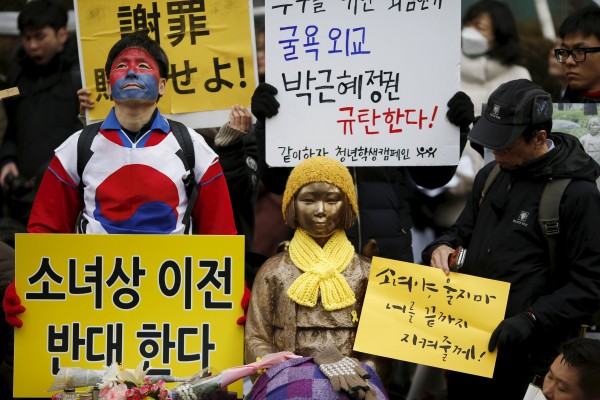Last November, I wrote a feature about the “Comfort Women”—the euphemistic term for women captured during the Second World War by the Japanese Imperial Army as sex slaves. A month later, Japan and South Korea reached a settlement to their longstanding dispute over the comfort women. The settlement includes an apology from Japanese Prime Minister Shinzo Abe and an $8.3 million aid fund from Tokyo for former comfort women.
While this event was praised by international observers, including the US government, many are still not satisfied. Advocates and former comfort women have presented issues with the deal in its current form. For instance, Japan’s apologies and compensation only extend to the comfort women from South Korea, despite remaining survivors and families in other countries across East Asia that suffered under Japan’s terror. Furthermore, the 46 remaining women survivors in South Korea were not consulted on the deal’s terms.
Yet one aspect that has not been in the limelight is Japan’s unchanging attempt to nationalize and whitewash historical educational agendas, which is a barrier to reconciliation among all those affected by the Second World War in Asia.
In December 2015, around the same time that Tokyo and Seoul reached the agreement, a joint statement was released in Perspectives on History published by the American Historical Association. Fifty Japanese scholars—of whom 48 were affiliated with a Japanese institution—demanded corrections to information on comfort women in a high school history textbook Traditions and Encounters: A Global Perspective on the Past, published by McGraw-Hill Education.
In late 2014, Japan’s Foreign Ministry told its New York consulate general to ask McGraw-Hill to change the depiction of comfort women in the same textbook. McGraw-Hill continues to stand by the textbook and its historical content.
Distinguishing between governmental intervention and academic peer review, Alexis Dudden, a professor of history at the University of Connecticut, said, “It’s not natural that a government intervenes in academic publication [….] Imagine if Ambassador Caroline Kennedy sent three people from the American embassy in Tokyo to various publishers of school textbooks to examine how Japanese textbooks portray the attack on Pearl Harbor.”
These developments are alarming in the face of the Tokyo-Seoul deal. Recently, Japan’s Ministry of Education, Culture, Sports, Science and Technology came out with a list of approved high school textbooks for the 2017 academic year. This list was produced under Prime Minister Abe’s instruction to the education ministry to only approve textbooks promoting nationalism and positions supported by its right-wing government—which entailed screening information about comfort women.
Such parallel movements—one of political reconciliation and the other of historical contestation—are a reminder that the comfort women issue is far from over. Japanese scholars attacking McGraw-Hill for information on comfort women is only one symptom of the whitewashing of Japan’s history. Its own national curriculum, revised for the upcoming academic year, confirms the unchanging nature of its historical revision.
Keeping history alive within education is integral, not only to hold wrongdoers accountable, but to ensure that history doesn’t repeat itself. Japan’s war history accounts for a large portion of geopolitical tensions today, and as new generations emerge, the importance of historical accuracy regarding the war is essential.
According to Mariko Oi, in a BBC article, “Japanese people often fail to understand why neighbouring countries harbour a grudge over events that happened in the 1930s and 40s. The reason, in many cases, is that they barely learned any 20th century history. I myself only got a full picture when I left Japan and went to school in Australia.”
There are long ways to go in all post-war treaties—but the first step is always acknowledgement of actions. While political diplomacy has inched forward in the deal between Tokyo and Seoul, true reconciliation between Japan and the nations of comfort women will not occur—nor last—until Japan acknowledges its actions within classrooms and stops meddling in the historical education of other countries.











Nationalistic teaching of history in Korea and China is also part of the problem. According to a 2011 study which compared popular history textbooks from the US, Japan, South Korea and China, the Japanese textbook actually turned out to be the least nationalistic, see http://www.nippon.com/en/in-depth/a00703/
Mentions of the Comfort Women in US textbooks have largely come about through lobbying by Korean American groups; as a result, they often reproduce the Korean nationalist narrative.j
For those who are interested, you can read the criticisms by the group of 19 Japanese historians on the factual content of the McGraw-Hill textbook (along with the original text of the section on comfort women) here:
http://19historians.com/requesting-correction-of-factual-errors-in-mcgraw-hill-textbook/
A more up-to-date article is published here: http://www.japantimes.co.jp/opinion/2016/03/09/commentary/japan-commentary/challenging-20-american-historians/#.VwTXjkfK-2l
Pingback: Spew of the day: Nationalist internet trolls – theunfilteredreporter
It is important to open eyes and seek what has been discussed by scholars. In Japan, there are numerous books and articles published in Japanese language on this issue, some of which are written by the world authority of Japanese history. History is a complex subject when it comes to interpret. One needs to consider from many perspectives. One essential perspective is to have a comprehensive overview of the long-term development of culture and the behaviour of people. Many scholars living outside Japan cannot read or have access to the sufficient level of resources and experience, but jump to conclusion too quickly. Scholars are aware of this danger. Students at McGill must be taught this too.
In jest, a friend remarked, “You can never apologize enough to a Korean.”
While one may laugh it off, the opinion seems to fit the apology some former Korean comfort women and their advocacy groups demand from Japan for crimes against Koreans committed during WWII. Since 1991, when Kim Hak-soon became Korea’s first former comfort woman to break the silence she and Korean society had kept for 46 years, Japanese officials delivered apologies (sah-gwa, a regret for less than the gravest offenses) several times ― beginning with Prime Minister Miyazawa Kiichi in 1992, and most recently Shinzo Abe in December 2015.
None of these “regrets,” however, has calmed the comfort women’s most vocal advocates, including the Korean Council for the Women Drafted for Military Sexual Slavery by Japan. According to them, apologies lack sincerity when not bolstered by what they term “legal” responsibility and compensation from Japanese government’s appropriated funds. So far, only privately raised, humanitarian “sympathy” money ― Peace Funds for Asian Women, matched by Japanese non-legislated government funds ― has been offered. Abe’s agreement to pay $8.3 million, accepted by S. Korean President Park Geun-hye in 2015, also did not fit the Korean activists’ definition of “legal” responsibility.
These hardliners equate comfort women and WWII Holocaust victims and insist that Japan’s apologies match what German Chancellor Willy Brandt offered in 1970 in Poland at a commemoration of Jewish victims of the Warsaw Ghetto Uprising. Brandt knelt in silence, which was interpreted as asking for “forgiveness” (sah-joe ― for the gravest sins) for Germany’s crimes against humanity committed during WWII.
Smashing the views the Korean activists propagated for decades, a few Korean scholars now hold their own countrymen culpable for the part they played in the implementation of the Japanese comfort women system, and they urge that Korea apologize to their comfort women. By depriving women and girls of basic human rights for centuries, Korea primed their women, the scholars say, to become exceptionally vulnerable targets of abduction, deceitful coercion or destitution-driven consent to work as sex workers. Korea also produced thousands who aided the implementation of the comfort women system. And, after the return of their comfort women, Korea slammed shut the gates of its society, leaving them shivering in the cold without food, housing, medical assistance or compassion for what they endured.
Noting Korea’s responsibility is Professor Park Yuha of Sejong University, an author recently ordered by a Korean court to pay $8,262 to each of the nine former Korean comfort women for defaming them in her book by, for one, grouping them with some Korean women who, perhaps destitution-driven, willingly sought employment as sex workers. While disagreeing with Park, some former Korean comfort women and their spokespersons do acknowledge a measure of Korea’s culpability and, according to Park, they sued the Korean government for $300 million ― claiming that to be their share of the $800 million Korea received as war reparations from Japan in 1965.
Some Korean academics stress that Korea’s overdue apology to their own women must be given immediately. However, Professor Bong Gwan-jun of KAIST argues, “We must make Japan apologize and compensate again before we admit our responsibility.” Yet another apology from Japan before Korea does right by its own women?
Jun’s word “again” resonates with the jest about no apology to a Korean being good enough. Attempting to blowtorch out of Japan a Willy-Brandt-on-the-knees-style begging for forgiveness, matched by “legal” funds, may never happen. Meanwhile, the surviving 44 comfort women― of the 238 who registered in S. Korea ― and the non-registered survivors, in their 90s, may die with han, hearts beaten to pulp.
http://www.koreatimes.co.kr/www/news/opinon/2016/04/162_202672.html